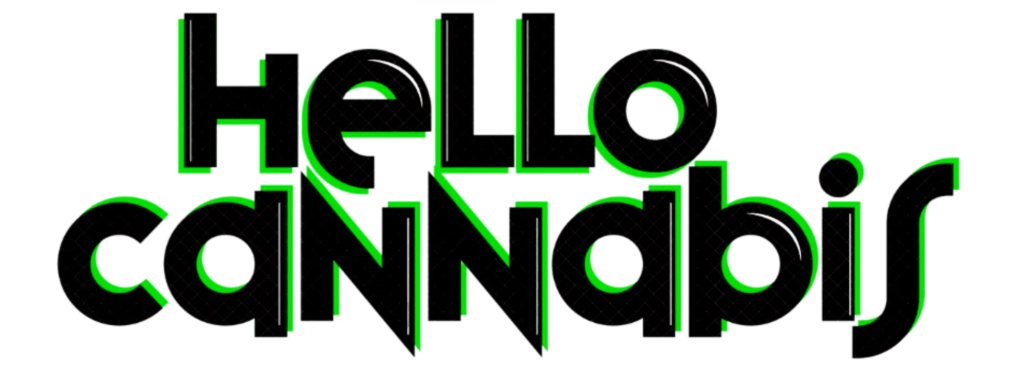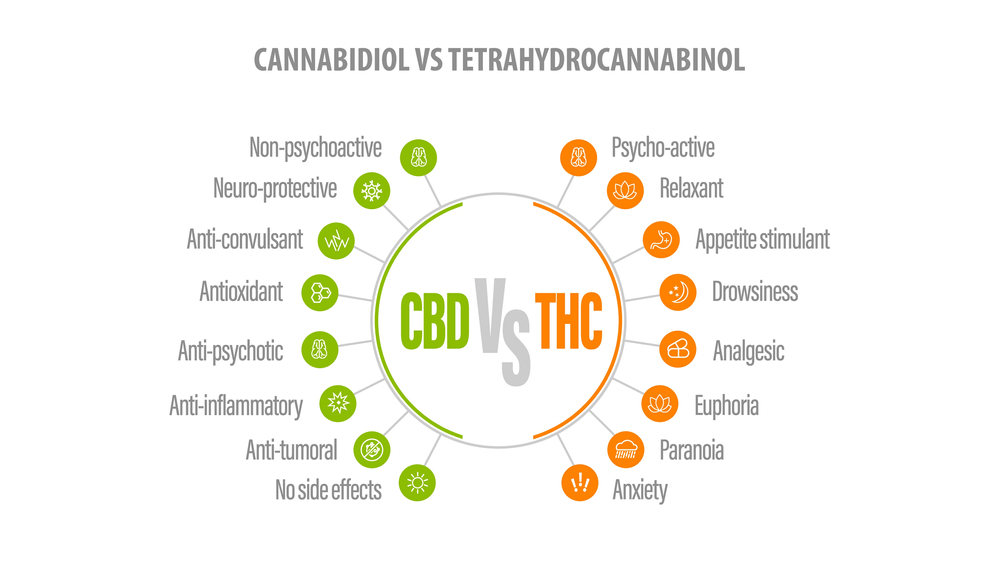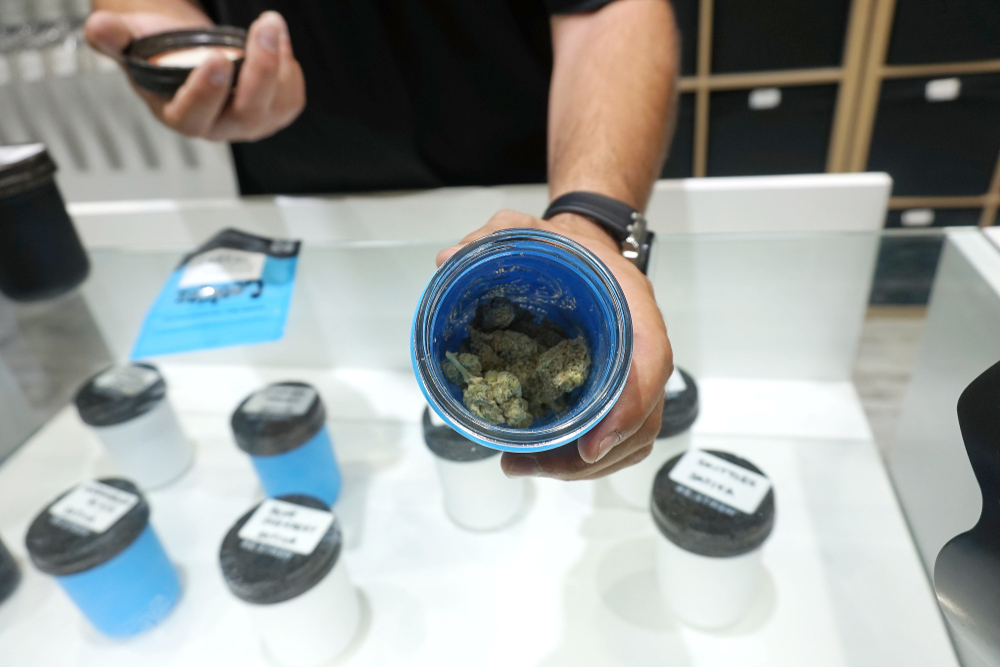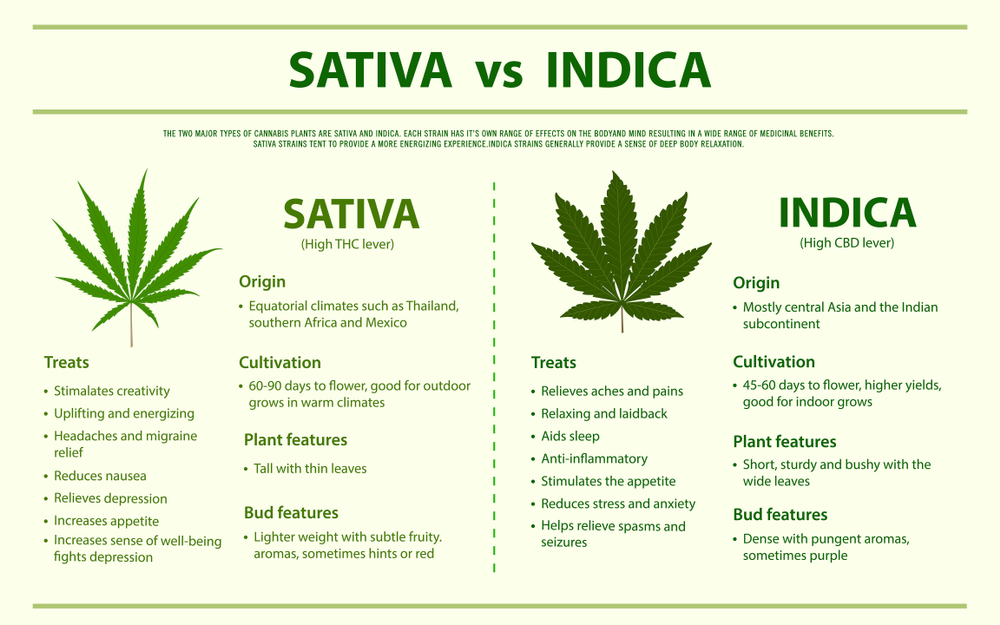While CBD and THC are both active compounds in the cannabis plant, a few key differences set them apart. This beginner’s guide will explore these differences and provide a better insight into what makes these natural compounds unique.
What is THC?
What is THC or tetrahydrocannabinol, you ask? Well, it’s one of over 100+ known cannabinoids found in the cannabis plant, and for many, it has successfully provided relief from a wide range of issues.
THC is special in its ability to interact with receptors within the human brain and central nervous system that are part of our body’s endocannabinoid system. This interaction produces various physical and psychological effects that make it much sought after for those living with chronic pain, inflammation, stress and more. What’s more — research continues to reveal more medicinal benefits of THC that extend beyond this list!
How THC Works in the Body
When THC enters the bloodstream, it attaches to cannabinoid receptors. These are found throughout the human body in the brain, blood vessels, nerves, and organs. They work like chemical triggers that help send signals from the brain to other parts of the body about hunger, concentration, pleasure, movement, thinking and coordination. THC also stimulates dopamine release in the brain, a neurotransmitter that helps with pleasure, appetite, and memory.
What is CBD?
CBD, or Cannabidiol, is the second most abundant cannabinoid in cannabis plants. CBD is also totally non-psychoactive, and it won’t get you ‘high’ like THC does — which means CBD has become an incredibly popular option for those who want to experience the therapeutic benefits of the cannabis plant without any undesirable effects. Instead, the effects produced by CBD are more focused on maintaining and regulating homeostasis, or natural balance, of the body.
Research has shown that CBD can be used to treat medical conditions ranging from anxiety, insomnia, migraines, muscle pain, and a variety of skin ailments, including inflammation and irritation. CBD also has neuroprotective properties, which help protect brain cells and even reduce the symptoms of neurodegenerative diseases like Parkinson’s and Alzheimer’s.
How CBD Works in the Body
Unlike THC, CBD does not attach directly to cannabinoid receptors in the brain. Instead, CBD works by increasing anandamide levels, an endogenous cannabinoid that plays a role in many critical physiological functions such as appetite, stress response, and pain management. CBD also works by inhibiting the reuptake of other neurotransmitters, such as serotonin or GABA, thus allowing them to stay active in the brain for extended periods.
Differences Between THC and CBD
Although THC and CBD are derived from the cannabis plant, they’re not the same. CBD does not have any psychoactive effects, nor will it make you ‘high’ like THC. CBD also has a much wider range of therapeutic applications than THC, including its anti-inflammatory, anti-anxiety and neuroprotective effects. Beyond this, let’s explore some key differences between CBD and THC.
Chemical Structure
Although these cannabis-derived compounds have the same chemical formula makeup–oxygen, carbon, and hydrogen atoms–the way these atoms are arranged is what sets them apart. THC has one hydroxy group, while CBD has two, which is what makes these natural compounds have such different effects on the human body. It might seem unbelievable at first glance, but even a tiny change in how hydrocarbons are arranged can result in chemicals with entirely different properties.
CBD vs. THC Sources
Because CBD can come from either hemp or marijuana, it is often derived from hemp to avoid adding larger amounts of THC. Therefore, while THC is also derived from marijuana, CBD products that are produced from cannabis may contain more THC than what the label suggests. CBD products made from hemp, on the other hand, typically have very low levels of THC since hemp plants naturally produce CBD with only trace amounts of THC.
Moreover, a cannabis sativa plant can be classified according to its potential CBD and THC production:
- Type I cannabis sativa has a THC level of more than 0.3% and less than 0.5% CBD.
- The cannabis sativa plant type II contains more than 0.3% THC and 0.5% CBD.
- Type III cannabis sativa has more than 0.5% CBD and less than 0.3% THC.
Type I and type II cannabis sativa are both marijuana, while type III is classified as hemp.
Psychoactive vs. Non-Psychoactive Properties
When CBD and THC enter the body, they interact with different receptors in the brain. CBD does not attach directly to cannabinoid receptors like THC, which is why CBD has no psychoactive effects. So while CBD may reduce some of the effects of THC, it doesn’t negate its psychoactive properties entirely; instead, CBD works by reducing anxiety and improving mood, helping to reduce the psychoactive effects of THC.
Legality
According to the 2018 Farm Bill, hemp-derived products containing CBD are legal if they have a THC level below 0.3% by dry weight. However, if the cannabis product has more than 0.3% THC, it is illegal under federal law — even if it’s derived from hemp.
State laws on both cannabis and hemp can be complex, making it difficult to determine what is legal and what isn’t. Here is a current cheat sheet:
- As of now, 19 states permit adults to use cannabis for both recreational and medicinal purposes.
- Seventeen states in the U.S. have legalized medical marijuana
- 11 states in the U.S allow for products with low THC and CBD levels
- There are three states in the U.S. where cannabis is not allowed at all.
- For more information on state medical cannabis laws, see here.
Because of constantly changing state and federal laws and emerging regulations, cannabis products are often inaccurately labeled. To ensure these products are sourced from legal sources and comply with local laws, it is essential to purchase from trusted companies.
Medicinal Uses
THC and CBD have long been praised for their medicinal benefits. These two compounds are most notably effective in treating nerve-based disorders like insomnia or chronic pain. They can also help with common issues like lack of appetite, skin problems, and more.
THC’s psychoactive effects make it preferable for pain management, particularly in chronic pain disorders like arthritis and migraines. It can be difficult for patients to manage and reduce severe forms of pain through conventional medicines and other drugs, so THC is especially useful in those cases.
CBD, on the other hand, is preferred when it comes to nerve-based disorders. Recent research has also led scientists to believe that CBD can treat more serious nerve disorders like epilepsy, seizures, and even schizophrenia. CBD’s interaction with human neural networks is still being studied in separate clinical trials.
Here is a (non-exhaustive) list of disorders that both these compounds can be used to treat:
CBD
- Nausea.
- Migraine.
- Seizures.
- Depression/Anxiety.
- Pain and Inflammation.
- Psychosis or mental disorders.
THC
- Pain.
- Nausea.
- Anxiety.
- Insomnia.
- Glaucoma.
- Low appetite.
- Muscle spasticity.
Though these two organic compounds work wonderfully separately, they can also work together to produce more powerful and longer-lasting medicinal effects. In addition, CBD can also reduce the psychoactive properties of THC, allowing for a broader range of medical applications without too much intoxication. This suggests that CBD’s non-psychotropic nature could help to make medical marijuana more accessible to a greater number of patients, as well as those with certain phobias or sensitivities.
Side Effects
THC and CBD can cause minor side effects, such as dry mouth, drowsiness, and dizziness. However, there can be instances in which THC can cause more serious side effects, such as:
- Panic attacks.
- Hallucinations.
- Rapid heart rate.
- Psychotic thinking.
- Coordination issues.
- High blood pressure.
CBD is generally considered non-addictive and safe, but it is important to note that some people experience negative reactions when consuming CBD or THC. Additionally, CBD may interact with certain medications, so if you are taking any medications, it is crucial to speak with your doctor before using CBD or THC products.
The Entourage Effect
The entourage effect is the term used to describe CBD and THC’s synergistic relationship. It states that THC and CBD work together to produce a stronger, more powerful overall experience. This suggests CBD may enhance the medicinal benefits of THC while simultaneously reducing psychoactive effects. CBD and THC are ideal for maximum therapeutic effects.
However, although preliminary research has shown promising results, there is no conclusive evidence yet of the validity of the Entourage Effect hypothesis.
How to Take CBD and THC
Both THC and CBD can be ingested using several different methods.
Smoking
As you’re aware, CBD and THC can be smoked using various devices, such as a pipe, joint, or blunt. Smoking CBD or THC provides the quickest relief from symptoms since the active compounds are absorbed into the bloodstream almost immediately upon inhalation. For those that enjoy a smooth, enjoyable experience, try pre-rolls like the Baby Jeeter Infused Mai Tai or Pure Beauty CBD babies for a relaxing CBD-only experience.
Vaping
If you’re not into smoking, you can also try vaping. CBD and/or THC oils are available in vape pens or other CBD-specific vaporizers. This method is similar to smoking in terms of its rapid effects, but it comes with fewer health risks due to the absence of smoke inhalation. Additionally, CBD and THC e-liquids and CBD/THC cartridge refills are available for those that own vape pens. Check out the PAX Live Rosin pod in California Orange or Remedies CBD 1:1 Strawnana Cartridge for a stellar CBD/THC experience.
Concentrates
Concentrates are a great option for those wanting to experience CBD and THC’s effects in full potency. CBD and THC can be consumed as wax, shatter, or other CBD/THC-infused products. These are perfect for the canna-savvy enthusiast looking for creative ways to indulge.
Edibles
Weed edibles or weed-infused food and drinks can be an excellent choice for people who’d like to experience the effects of CBD and THC but don’t like smoking or vaping. Infused edibles come in various shapes, sizes, flavors, and doses to suit everyone’s needs. Snack on Highatus Green Apple Sour Gummies or Kanha’s NANO Vegan 20:1 Serene Green Apple CBD Gummies.
Capsules
Similar to edibles, capsules are easy to ingest CBD and/or THC without fuss. CBD and THC capsules come in a range of dose sizes, so you can choose the perfect amount of CBD/THC for your needs; they also offer a discreet way to consume CBD or THC if that’s what you prefer. Give Care By Design’s Focus Soft Gels or Buddies THC Gelcaps a try for a better experience.
Topicals
Topicals, like creams, transdermal patches, salves, balms, lotions or oils, can relieve localized issues like muscle pain, joint pain and skin irritations. The soothing effects of CBD and THC topicals can be experienced without any psychoactive effects. Go for Papa & Barkley Releaf Patch CBD and High Gorgeous by Yummi Karma Wild Thing Body Lotion for a natural CBD and THC experience.
Overall, CBD and THC offer many therapeutic and medical benefits that can be experienced in many forms. So whether you’re looking to achieve relief from localized pain or chronic conditions, there’s bound to be a perfect CBD/THC product for your needs.
FAQs
Are both CBD and THC controlled substances?
Yes, both CBD and THC are classified as controlled substances under federal law. However, hemp-derived CBD products with a maximum of 0.3 percent THC are legal in all 50 states.
Do most standard drug tests look for traces of CBD and THC?
Most drug tests are designed to detect the presence of THC, not CBD. However, there is still a chance that trace amounts of THC could be detected in some CBD products.
Are FDA-approved CBD and THC products available?
Yes, a handful of FDA-approved CBD and THC products are on the market today. Epidiolex is the only FDA-approved CBD product, while Marinol and Cesamet are approved THC products.
Get the Best of Both Worlds
Why not enjoy both THC and CBD for complementary and integrative health? At Hello Cannabis, there’s a little bit of everything! We provide a variety of CBD/THC products from some of the best brands in the cannabis industry. Explore what we’ve got and find your perfect product today. Shop in-store or order online for pickup!



